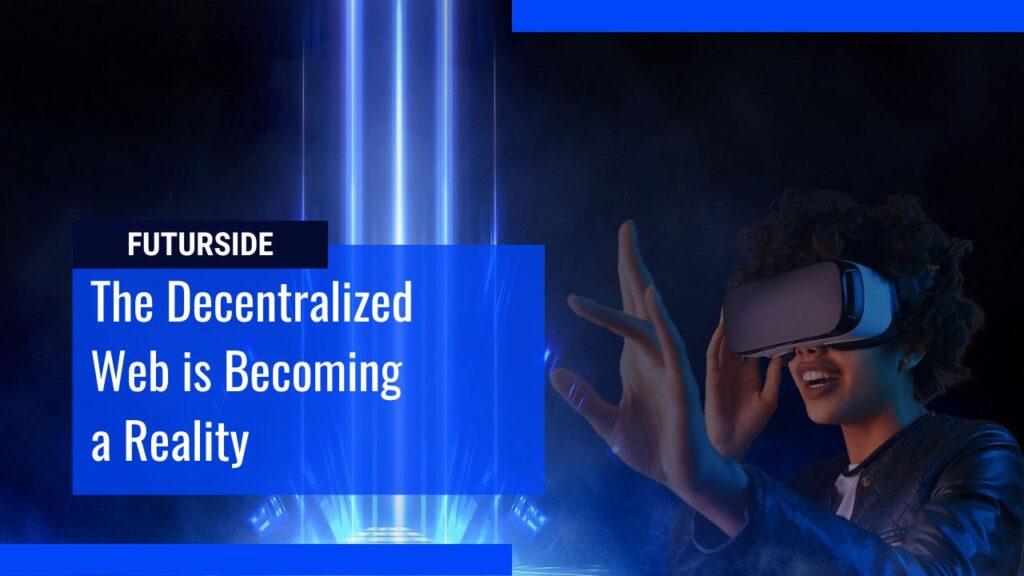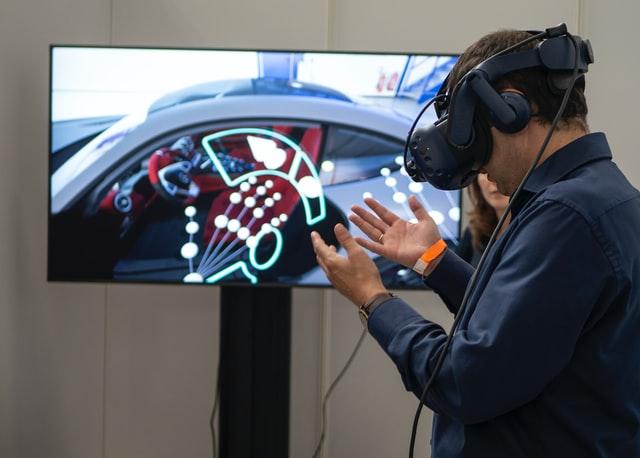During the past decade, a new wave of technological advancement has fueled innovations like Blockchain, cloud computing, Internet of Things, Artificial Intelligence and machine learning. These new technologies are set to revolutionize the world and have one thing in common, the internet. Hence, with these innovations, the next generation of the web is already rolling out, the web 3.0.
Although the history of the World Wide Web is long and varied, there is a clear trend that the internet is becoming increasingly integrated into people’s lives. The web ecosystem is vast and invisible and constantly changing, so the user experience is increasingly changing. A major change that will make web 3.0 the new internet is the absence of centralized databases, web servers, and software.
The future version of the internet could be decentralized, using blockchain technology to facilitate transactions. It would be decentralized, allowing consumers to access the net without the intermediaries of centralized services. This will allow individuals to control their own sections of the web and participate in the global economy without paying any fees to third parties.

Web 3.0 will be an internet-based on decentralized architecture where no single organization controls contents or the internet itself. It will be powered by decentralized applications that run on blockchains and p2p networks, giving equal authority to the owners. It will use blockchain as a shared state machine maintained by anonymous nodes.
While Web 2.0 leveraged the Internet as a platform, this new iteration will place data on blockchain technology. Using blockchain for data storage will make it more secure and transparent and protect consumer data from hackers. With this technology, the impact of Web 3.0 is far-reaching.
Blockchain eliminates the need for central power and allows anyone to join the network. It helps prevent hacker attacks as the information is encrypted from start to finish. This decentralized technology also enables the cheap transfer of digital assets across borders. Blockchain-based Internet browsers are the gateway to web 3.0.
In this cyberspace, people will own their information, and data storage will be decentralized. Users will have greater control over their personal information and they will be the sole owners of their digital assets. Ultimately, this will be beneficial for both consumers and technology companies.
The future of the internet might be a decentralized and anonymous one. It will allow multiple applications to interact with the same information. The online space will be available everywhere, so Web 3.0 will bring new possibilities to everyday life. This is a very promising development, but it will require a number of technologies to be fully realized.
In web 2.0 and 1.0, providers store all information about user interaction. The data is largely owned by the service provider. In the third generation of the internet, different stakeholders will retain ownership of their information, creating a new business model based on the monitoring of data. It is expected that this new system will reduce the risk of massive data leaks and will make the online world more resilient to censorship.
This will also enable machines to decode the meaning of content and improve data connectivity. The system will also have continuous data processing and multiple backups. This means that users would have better security and privacy. Moreover, Web 3.0 will enable the use of artificial intelligence (AI) to manage customer support.
The rise in AI development will allow intelligent chatbots to interact with many consumers at once. This new technology will also help to improve customer service. Many successful firms aren’t able to scale their customer support operations. Hence, AI will make customer support easier and more effective as chatbots will be able to answer consumer questions in real-time.
With these technologies, people will even be able to talk in natural language with a search engine. The future of the web will also enable individuals to have unique identities and access them from anywhere. It will allow users to access the internet at any time from anywhere, as well as be the sole owner of their digital assets.

As the world’s population continues to grow, the ability to tailor content to individual preferences and tastes is becoming more difficult and important. With the help of artificial intelligence and big data, web 3.0 will provide a highly personalized browsing experience. With the help of machine learning, websites will adapt to your preferences and interests.
The future of the internet will also be based on big data and machine learning, so you can expect the future to be interesting. With the use of AI to decode information and interpret hidden patterns. A website may be able to understand a user’s sarcasm. The online space will change and new platforms will make it easier for users to create websites and interact with them.
Another key feature of web3 is the fact that it will be difficult to monopolize the internet. For instance, Big Tech companies have become so entrenched on the net that they are gaining control over everything. With blockchain technology the way information is stored will change. With blockchain, data will be managed on many computers instead of a single central authority.
The third iteration of the internet is based on three pillars of technological innovation such as edge computing, decentralized data networks and AI. These pillars will make the internet a powerful tool to empower organizations and individuals. The decentralized nature of internet 3.0 allows for more freedom for users while eliminating the need for centralized censorship.
And thanks to the Internet of Things, we’re already one step closer to creating the perfect world. The IoT will enable more efficient browsing, better advertising, and more responsive customer support. With it, more devices can connect to each other generating even more information. And it will be possible to connect connected smart homes to the internet.

As big data and ML are already revolutionizing the world. Today’s applications are mostly social, while the 3rd generation internet will be centered around streaming and shopping. It will also include machine learning and the Semantic Web. Although the term Web 3.0 is still a relatively new technology. Ultimately, it will be the new internet.
Contents
Importance of Web 3.0
Until recently, the online space has concentrated on the appearance of websites and webpages, with little attention paid to the user experience. Web 3.0 allows websites to last much longer and it provides flexible peer-to-peer communication that fosters governance bonds between participants.
The internet is being run by tech giants who make enormous profits from the personal information they collect from users. Internet 3.0 aims to put the control of the web back in the hands of users and creators. Because it is built on decentralized data, users will be able to access their information at any time. As a result, there will be much less chance of a major security breach.
As a result of web 1.0 and 2.0, every interaction that you have with a website, service or product is stored on a server by the provider and consumers don’t own the information that they collect. Internet 3.0 will change this. Instead of being owned by a single company, the data will be held by different stakeholders, who can then reclaim ownership of it.
Web 3.0 aims to eliminate the middleman. Today, companies have to deal with third-party intermediaries to access customer data. This can be both costly and time-consuming. The decentralized web eliminates this middleman and allows businesses to conduct business directly with consumers. It encourages data sharing between humans and machines while fostering a secure environment.
The decentralized internet is based on the principle of privacy and transparency which promises to make the online space more secure than ever. It combines users and machines in decision-making and content production. It is a revolutionary transformation in internet infrastructure, moving it from being a supporting tool to becoming the central protagonist.
The decentralized platform will enable users to perform more complex and intensive knowledge creation tasks on the net, including client demand forecasting, personalized customer service and more. In addition, web 3.0 will create an ecosystem around the users that will drive business and innovation in the future.
This new internet technology makes it possible to transfer your assets globally and eliminates the need for a middleman. Users can own their information and not allow brands to sell it to them. Users can easily transfer data between devices or share it with their networks. This will remove the need for large intermediaries, social platforms and centralized governing bodies.
Blockchain will make the online space a much more democratic place and allow users to control the content and information they share with others. The impact of web 3.0 is a broad-scale change in our society. This technology will accelerate the adoption of 3D graphics and the use of cross-platform development tools. It will also make the internet more immersive and interactive.
This internet iteration will focus on connecting decentralized data and enabling computers to interpret information as intelligently as human beings. Users will be able to connect seamlessly with the data and services that they use. This new business model will be focused on monitoring data. The goal is to make internet 3.0 as intelligent as possible and artificial intelligence will play a key role in this process.
Artificial intelligence will be the key to Web 3.0’s success, as machines will be able to interpret and understand semantics. In other words, it will change the way we live, work and interact with the world. The internet is already ubiquitous but this new web will bring even more possibilities.
Impact of Web 3.0
Web 3.0 is the next stage of the web’s evolution. As a result of these new features, the online world will become more intelligent and human-friendly. It will become possible for AI systems to run smart programs that help users with their tasks and will enable the intelligent creation of highly targeted content for users.
The benefits of Web 3.0 go beyond personalization. It will be possible to deliver relevant information to users by removing intermediaries and enhancing customer service. It will place digital information within a single environment, blurring the line between digital information and physical objects. The technology will also change the way that businesses operate.
Technology has made it easy for tech giants to control user-generated data. The third iteration of the net will allow full ownership of information. The new system will also allow users to monetize this information. This will lead to a radically new internet. The future is bright for internet users and developers alike as data ownership will become a reality.
With Web 3.0, you can own your information and transfer it across platforms, eliminating the need to maintain multiple profiles. In addition, you will be able to sell your data to brands or use it to build advertising campaigns. With this new internet, you can take your data with you, making it easy to access your information from anywhere. The technology is already making a difference for businesses.
In the past, users could only view information based on a single computer system and it was often very complicated to transfer large amounts of data. In this online space, computers are connected directly to one another, allowing for greater communication and collaboration between partners and employees. This will make business more effective and efficient.
The benefits of Web 3.0 will also extend to web apps. More users will be able to experience richer experiences. An increasingly digital-centric society will increase the demand for more services, including web applications. Web3 will make the online world more accessible and intuitive.
The new internet
The future of the Internet is a long-term idea. In fact, web 3.0 may not exist as a single idea. It will likely consist of several, interrelated ideas and continue to grow until it reaches the point where centralized companies are replaced by decentralized unregulated DAOs. The web will allow for unprecedented collaboration between people.
By doing so, online content and services will be more accessible and controlled by users, eliminating the need for centralized repositories, social platforms and big intermediaries. With access to public and private data, users will have a much better understanding of the world.
Web 3.0 will allow people to trade value with total strangers, minimizing the need for trusted intermediaries. This will reduce the need for fee-charging middlemen. With this new iteration, the Internet will be more secure and this will allow people to share more information without worrying about privacy or security. It will allow for the creation of Non-Fungible Tokens (NFT).
This is an innovative digital asset that is end-to-end encrypted. This will ensure that it is not duplicable and therefore increase its value. Internet 3.0 will also facilitate the creation and distribution of a metaverse, a virtual reality that will allow people to combine their physical and digital lives. Users can interact with others, buy and sell items and earn revenue in the virtual market.
Another important feature of Web 3.0 is the introduction of decentralized applications. Similar to the applications you install on your laptops and smartphones, Dapps use blockchain technology to keep your personal information out of the hands of corporations. As such, Dapps can also use cryptocurrency, which is a type of decentralized money.
The future will be defined by the decentralization of data and the ability of computers to interpret information as intelligently as humans. A major role for Web 3.0 in this future will be played by artificial intelligence, which will allow machines to interpret data. This technology will have a profound effect on the future of the Internet.
By distributing control of a platform amongst users, Web 3.0 will change the way cyberspace functions today. This will enable users to take ownership of their data, as opposed to having it controlled by one central entity. By combining AI and machine learning, Web 3.0 will allow the creation of highly personalized content for users and more efficient internet.

0 Comments